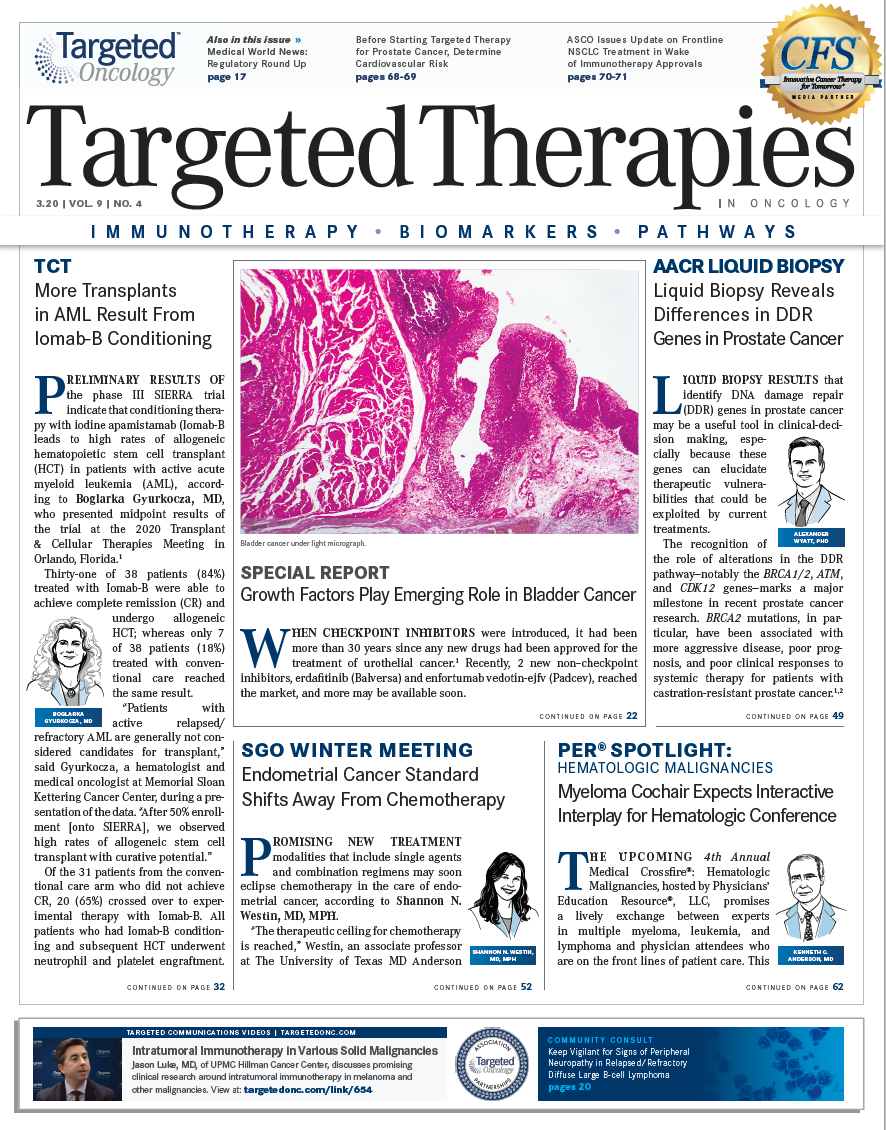Investigators Gain Actionable Information Without Tumor Tissue
Use of the liquid biopsy assay MSK-ACCESS has led to detection of actionable genetic variants in 40% of tumor samples, offering an attrac­tive alternative to invasive tumor biopsies in patients with no available tissue for testing.

Use of theliquid biopsy assay MSK-ACCESS has led to detection of actionable genetic variants in 40% of tumor samples, offering an attrac­tive alternative to invasive tumor biopsies in patients with no available tissue for testing. This test also allows clinicians to test for genetic variants at multiple points in the course of the disease, according to A. Rose Brannon, PhD,who presented data at the Advances in Liquid Biopsies confer­ence hosted by the American Association for Cancer Research.1
“When you do…a fine needle or other types of biopsy, or test on a surgical specimen, you’re looking at 1 point in time. By doing MSK-ACCESS, you can more easily sample at different times to get an understanding of how the tumor may be changing,” Brannon, associate director of clinical bioinformatics in the Department of Pathology at Memorial Sloan Kettering Cancer Center (MSK) in New York, New York, said in an interview withTargeted Therapies in Oncology. “If a patient has multiple metastases or a het­erogeneous primary tissue, you would be able to potentially detect alterations from multiple different sites. It allows for [the detection of] temporal heterogeneity.”
MSK-ACCESS, which stands for Analysis of Circulating Cell-free DNA to Evaluate Somatic Status, had the ability to detect mutations in specific exons of 129 different genes. MSK designed the assay to identify alterations in 84% of all tumors sequenced at the center, including rare tumors and over 90% of lung and breast tumors. In total, 28% of the single-nucleotide variants (SNVs) and indels detected by the test in the current clinical cohort are considered to be actionable, or those with available targeted therapies.
Clinical Validation
The test has been clinically validated and implemented by members of MSK’s Molecular Diagnostic Service and has also received approval from the New York State Department of Health.2These same investigators are those responsible for the MSK-IMPACT assay, a qualitative in vitro diagnostic test that uses targeted next-generation sequencing (NGS) of tumor tissue to detect gene alterations in a broad multigene panel.3
“New York State’s validation requires us to address accuracy, precision in reproducibility, and sensitivity, as well as draw up strong documentation on the processes that we would be using for library construction, sequencing, and analysis,” Brannon said.
To do this, investigators used 69 samples of cell free DNA (cfDNA) with known variants that were previously confirmed with an orthogonal method, whether it was by polymerase chain reaction or NGS, to determine the accuracy of the test. Validation was done concurrently on HiSeq 2500 and NovaSeq 6000 systems.
The investigators used 42 samples to show reproducibility of detecting oligometastatic frequencies of both SNVs and indels. They used Seraseq ctDNA reference material because of the ability to examine samples at allele frequencies of 5.0%, 2.5%, 1.5%, and 0.1% and to determine the different call rates at each dilution.
Clarifying Germline and Clonal Hematopoiesis Calls
One issue with the use of plasma testing for genetic alterations is the accumulation of mutations in the blood by clonal hematopoi­esis (CH), which may give a false-positive reading for an actionable mutation. This is an especially important consideration in aging patient populations who receive repetitive plasma testing, possibly after chemother­apy or other treatments, and who may be experiencing an increase in the number of somatic alterations in the blood. Mutations that occur at high frequency are typically those that can be identified as germline or are a result of CH, but exceptions exist and need to be controlled for.
To manage this, the investigators who devel­oped MSK-ACCESS sequenced time-matched white blood cells to filter out CH mutations detected in the blood and home in on those that were somatic to the tumor. Therefore, mutations seen in both cfDNA and white blood cells can potentially be the result of a CH mutation.
Referring to a patient treated in the clinic, Brannon said, “An outside company had reported anATMalteration for one of our patients, and the report even suggested poten­tial therapies for this alteration; but because we had sequenced the normal buffy coat, which are the white blood cells, we were able to see that it occurred at the exact same frequency as in the normal [cells].” This realization spared the patient from treatment with targeted ther­apies that were being inappropriately recom­mended for a germline mutation by the results of a commercial assay.
In another patient with lung cancer, exter­nal reporting identified aKRASmutation in a patient with nonsmall cell lung cancer; the mutation is often used as a prognostic biomarker, and indicates lack of therapeutic efficacy with EGFR tyrosine kinase inhibitors.4 By confirming the presence ofKRASin white blood cells and cfDNA, investigators were able to reasonably predict that this may have been present because of a CH mutation.
Clinical Utility
Advantages of using this new liquid biopsy assay for patients receiving cancer treatments over time lie in the clinician’s ability to combine these results with those of tumor tissue tests.
“Because of how we have designed this assay, we do pull in alterations from patients’ previous tests,” Brannon said. “{If they have received MSK-IMPACT in the past, we use that for more information in order to attempt to call at an even lower variant frequency.”
Brannon went on to say that information from tumor-derived sequencing results can provide a more comprehensive clinical picture for patient care. This holds promise for the future, when serial sampling will be available for patients with metastatic disease and multi­ple sites of metastases.
References
- Brannon AR. Validation and clinical implementation of MSKACCESS. Presented at: Advances in Liquid Biopsies; January 13-16, 2020; Miami, FL.
- MSK-ACCESS receives New York State approval for new molecular assay. Memorial Sloan Kettering Cancer Center website. bit.ly/2SmzDpe. Published June 11, 2019. Accessed February 7, 2020.
- Evaluation of automatic class III designation for MSK-IMPACT (Integrated Molecular Profiling of Actionable Cancer Targets). FDA website. bit.ly/2Owxqqb. Accessed February 7, 2020.
- National Comprehensive Cancer Network. Clinical Practice Guidelines in Oncology. Nonsmall Cell Lung Cancer (version 2.2020). bit.ly/31zStNP. Published December 23, 2019. Accessed February 7, 2020.

Survivorship Care Promotes Evidence-Based Approaches for Quality of Life and Beyond
March 21st 2025Frank J. Penedo, PhD, explains the challenges of survivorship care for patients with cancer and how he implements programs to support patients’ emotional, physical, and practical needs.
Read More